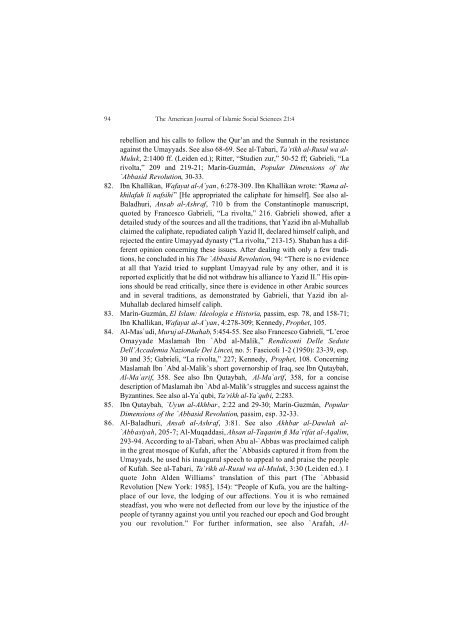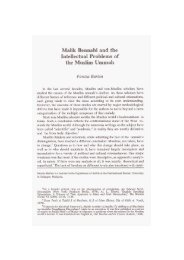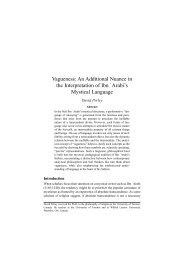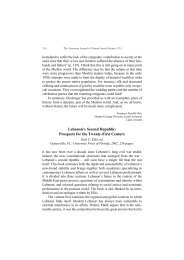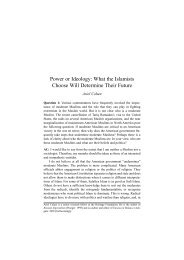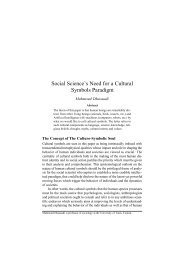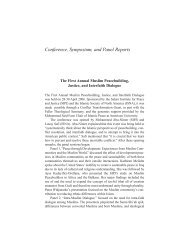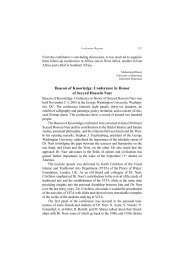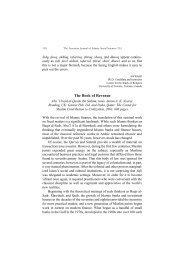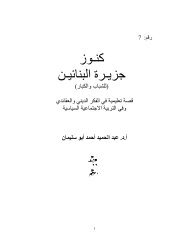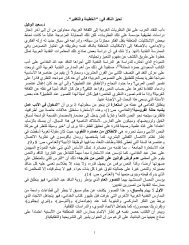Arab Tribes, the Umayyad Dynasty, and the `Abbasid ... - Epistemology
Arab Tribes, the Umayyad Dynasty, and the `Abbasid ... - Epistemology
Arab Tribes, the Umayyad Dynasty, and the `Abbasid ... - Epistemology
Create successful ePaper yourself
Turn your PDF publications into a flip-book with our unique Google optimized e-Paper software.
94 The American Journal of Islamic Social Sciences 21:4<br />
rebellion <strong>and</strong> his calls to follow <strong>the</strong> Qur’an <strong>and</strong> <strong>the</strong> Sunnah in <strong>the</strong> resistance<br />
against <strong>the</strong> <strong>Umayyad</strong>s. See also 68-69. See al-Tabari, Ta’rikh al-Rusul wa al-<br />
Muluk, 2:1400 ff. (Leiden ed.); Ritter, “Studien zur,” 50-52 ff; Gabrieli, “La<br />
rivolta,” 209 <strong>and</strong> 219-21; Marín-Guzmán, Popular Dimensions of <strong>the</strong><br />
<strong>`Abbasid</strong> Revolution, 30-33.<br />
82. Ibn Khallikan, Wafayat al-A`yan, 6:278-309. Ibn Khallikan wrote: “Rama alkhilafah<br />
li nafsihi” [He appropriated <strong>the</strong> caliphate for himself]. See also al-<br />
Baladhuri, Ansab al-Ashraf, 710 b from <strong>the</strong> Constantinople manuscript,<br />
quoted by Francesco Gabrieli, “La rivolta,” 216. Gabrieli showed, after a<br />
detailed study of <strong>the</strong> sources <strong>and</strong> all <strong>the</strong> traditions, that Yazid ibn al-Muhallab<br />
claimed <strong>the</strong> caliphate, repudiated caliph Yazid II, declared himself caliph, <strong>and</strong><br />
rejected <strong>the</strong> entire <strong>Umayyad</strong> dynasty (“La rivolta,” 213-15). Shaban has a different<br />
opinion concerning <strong>the</strong>se issues. After dealing with only a few traditions,<br />
he concluded in his The <strong>`Abbasid</strong> Revolution, 94: “There is no evidence<br />
at all that Yazid tried to supplant <strong>Umayyad</strong> rule by any o<strong>the</strong>r, <strong>and</strong> it is<br />
reported explicitly that he did not withdraw his alliance to Yazid II.” His opinions<br />
should be read critically, since <strong>the</strong>re is evidence in o<strong>the</strong>r <strong>Arab</strong>ic sources<br />
<strong>and</strong> in several traditions, as demonstrated by Gabrieli, that Yazid ibn al-<br />
Muhallab declared himself caliph.<br />
83. Marín-Guzmán, El Islam: Ideología e Historia, passim, esp. 78, <strong>and</strong> 158-71;<br />
Ibn Khallikan, Wafayat al-A`yan, 4:278-309; Kennedy, Prophet, 105.<br />
84. Al-Mas`udi, Muruj al-Dhahab, 5:454-55. See also Francesco Gabrieli, “L’eroe<br />
Omayyade Maslamah Ibn `Abd al-Malik,” Rendiconti Delle Sedute<br />
Dell’Accademia Nazionale Dei Lincei, no. 5: Fascicoli 1-2 (1950): 23-39, esp.<br />
30 <strong>and</strong> 35; Gabrieli, “La rivolta,” 227; Kennedy, Prophet, 108. Concerning<br />
Maslamah Ibn `Abd al-Malik’s short governorship of Iraq, see Ibn Qutaybah,<br />
Al-Ma`arif, 358. See also Ibn Qutaybah, Al-Ma`arif, 358, for a concise<br />
description of Maslamah ibn `Abd al-Malik’s struggles <strong>and</strong> success against <strong>the</strong><br />
Byzantines. See also al-Ya`qubi, Ta’rikh al-Ya`qubi, 2:283.<br />
85. Ibn Qutaybah, `Uyun al-Akhbar, 2:22 <strong>and</strong> 29-30; Marín-Guzmán, Popular<br />
Dimensions of <strong>the</strong> <strong>`Abbasid</strong> Revolution, passim, esp. 32-33.<br />
86. Al-Baladhuri, Ansab al-Ashraf, 3:81. See also Akhbar al-Dawlah al-<br />
`Abbasiyah, 205-7; Al-Muqaddasi, Ahsan al-Taqasim fi Ma`rifat al-Aqalim,<br />
293-94. According to al-Tabari, when Abu al-`Abbas was proclaimed caliph<br />
in <strong>the</strong> great mosque of Kufah, after <strong>the</strong> <strong>`Abbasid</strong>s captured it from from <strong>the</strong><br />
<strong>Umayyad</strong>s, he used his inaugural speech to appeal to <strong>and</strong> praise <strong>the</strong> people<br />
of Kufah. See al-Tabari, Ta’rikh al-Rusul wa al-Muluk, 3:30 (Leiden ed.). I<br />
quote John Alden Williams’ translation of this part (The <strong>`Abbasid</strong><br />
Revolution [New York: 1985], 154): “People of Kufa, you are <strong>the</strong> haltingplace<br />
of our love, <strong>the</strong> lodging of our affections. You it is who remained<br />
steadfast, you who were not deflected from our love by <strong>the</strong> injustice of <strong>the</strong><br />
people of tyranny against you until you reached our epoch <strong>and</strong> God brought<br />
you our revolution.” For fur<strong>the</strong>r information, see also `Arafah, Al-


